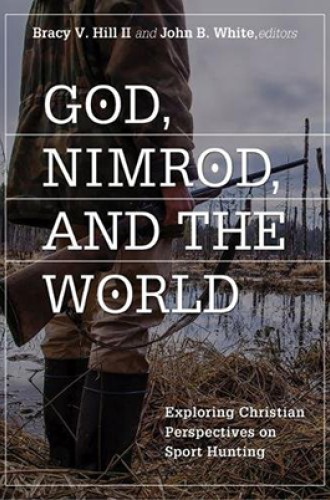Should Christians hunt animals?
A book of essays offers an array of perspectives for and against.
I have yet to meet another theologian in a duck blind. It’s not that I haven’t tried. But the pastime of sport hunting, pursued by over 12 million Americans annually, does not seem very popular among clergy and academic theologians, especially those of the progressive variety. Bracy V. Hill II and John B. White, both of whom teach at Baylor University, aim to amend the dearth of theological reflection on hunting with this volume, but part of what they uncover explains exactly why so few progressives appreciate hunting.
First, a definition. “Sport hunting” basically means hunting that is not necessary for survival. Surely subsistence hunters still exist in remote corners of our planet, but they’re few and far between. Most of us who hunt do so for enjoyment and recreation, whether our goal is food on the table or a mount on the wall. We don’t need to hunt, we choose to hunt.
Read our latest issue or browse back issues.
Hill and White divide their book into two sections. The first, which they title “Descriptive,” contains essays from a wide variety of scholars reflecting on various historical perspectives on hunting, from how the biblical figure of Nimrod was portrayed in the Middle Ages to a fascinating consideration of C. S. Lewis’s disdain for hunting as conveyed in his science fiction novel Out of the Silent Planet.
The most compelling essay in this section is by the late Stephen H. Webb, an outspoken (albeit conflicted) vegetarian and animal rights activist. Webb considers Naucratius, the less well known brother of Basil the Great and Gregory of Nyssa. A solitary ascetic—an anchorite—in the Eastern tradition, Naucratius lived at the edges of society, hunting and sharing meat with those in need as part of his service to God. Like the Desert Fathers and Mothers, he pushed himself physically in concert with pushing himself spiritually.
That Webb would not pen one of the antihunting essays in this book might come as a surprise, but it is in keeping with his contrarian nature, as is his conclusion:
The vegetarian and the hunter are moral companions in the treatment of animals. Vegetarians and hunters, unlike consumers of industrialized agricultural products, both acknowledge that humans have the power of life and death over animals and that choosing to take an animal’s life should be done in a way that does not make beasts of men.
Part 2 of the book, titled “Prescriptive,” collects academic essays tackling the question of hunting from a Christian perspective. One essay argues that Christians should neither hunt nor take a life of any kind (don’t slap that mosquito!). Another labels all antihunting theologies as modern-day forms of Gnosticism. Others try, with greater or lesser success, to bring the work of Jacques Derrida, Stanley Hauerwas, and José Ortega y Gasset to bear on sport hunting.
A couple of the chapters in this section take up and criticize the connection between hunting and “muscular Christianity,” which leads me to the most troubling part of this book. Between the two sections stands an interlude, “In Their Own Words: On Hunting, by Hunters,” in which a variety of Christian hunters give first-person accounts of why they hunt. Professional athletes and stars of hunting television shows (including Duck Dynasty) are included, and their testimonies are disconcerting. They seem completely unaware that a Christian might have an ethical dilemma when considering whether to violently end the life of another creature. Virtually every one of them cites Genesis, saying that humans have dominion over other animals, and that’s where their deliberation of the matter ends. (Several of them also refer to John Eldredge’s manifesto of evangelical masculinity, Wild at Heart.)
However, I’m happy to report that the single best ethical defense of hunting that I’ve ever read also comes in this section of the book. In less than two pages, religion scholar B. Jill Carroll successfully argues that “predation is a fundamental mechanism of existence on the earth, a grounding process of life and death in the world.” She continues,
I am a human animal alongside all other animals, living and dying, eating and being eaten. I accept this reality; I accept my place within this reality. I am not willing to estrange myself from the world by morally condemning this fundamental aspect of our larger existence. To morally condemn predation would be to condemn the whole world. I can’t bring myself to do that. I love the world too much.
Hunters—at least those who eat their quarry, which is almost all hunters—could do a lot worse than to embrace a theology so incarnational and world-affirming.







